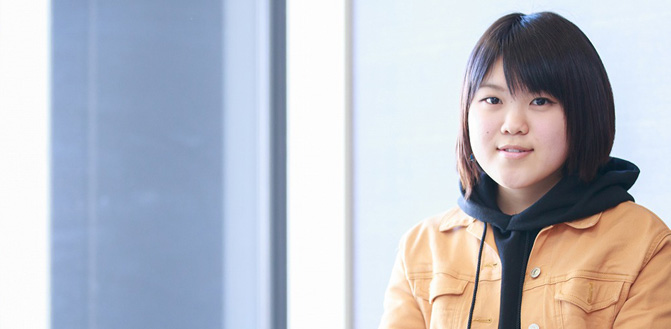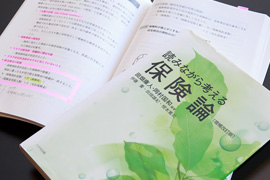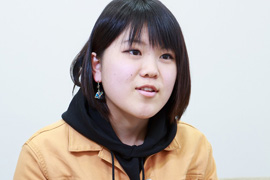- Student life
- Three fields of study
- Student's Graduation Thesis Theme
-
Student Blog
“Every day with Sha-an” - Award History
- Interview with Students
- Interview with Graduates
- Introduction of the Campus
- Campus Festivals
1. Societal Safety Science from the Perspective of Society
Deepening knowledge about "insurance" necessary for daily life
Research Theme
Environmental impairment liability insurance
Moe Nakachi of the Kinzou Kuwana Research Group
(Graduated from Kousen High School)

Reasons for my interest in this subject
After I took lectures on insurance in my second year, I felt that I wanted to know more. That is my reason for joining this research group.
Insurance is usually considered to cover losses caused by accidents. However, signing up for insurance will also raise people’s awareness of accident prevention. Likewise, environmental impairment liability insurance for companies is expected to have a preventive effect on environmental pollution. I thought that knowledge of insurance could be beneficial for dealing with environmental pollution problems and chose this theme.
Research Flow

We collected information on Minamata disease, which is one of Japan's four major pollution-related diseases, by reading both articles and online documents. In 1956, a chemical industry company leaked nitrogen waste into the sea in Minamata City, Kumamoto Prefecture, and people who ate fish from the contaminated sea developed organic mercury poisoning. The disease was then called Minamata disease. Since there was no environmental impairment liability insurance in Japan at that time, the trial was prolonged, and the company and the country paid a large amount of reparation.
In 1992, environmental impairment liability insurance was developed and sold in Japan, and the Japanese people’s interest in ecological risks has gradually increased.

To investigate how much environmental impairment liability insurance is spreading in Japan, we investigated insurance companies. As a result, many insurance companies still do not deal with environmental impairment liability insurance even after nearly two decades of its launch.

Through the Internet, we researched cases in China where pollution caused by PM 2.5 is getting worse. In China, environmental impairment liability insurance is experimentally enforced on to companies with high risks of environmental pollution.
However, it was tough to collect the necessary information. Information on Chinese companies is not disclosed very much. Many websites are also in Chinese, and much time was required to translate the sites. In addition to information collected on the Internet, lectures by Professor Kuwana, who is studying environmental pollution, helped me to deepen my knowledge for research on overseas cases.
STEP4. Examination of advantages and disadvantages of the insurance
An advantage is that even if an accident happens, it is possible to reduce corporate asset fluctuations and to promote the early purification of environmental pollution because payment from insurance companies is secured. In addition, for insurance companies, as the number of contracted enterprises increases, more data on environmental pollution risks can be accumulated. That makes it easier to quantify insurance premiums and insurance fees, and consequently, they can strengthen the sale of insurance products.
On the other hand, a disadvantage is that it takes time and considerable expense to join insurance. In order to judge a company’s potential environmental pollution risk, insurance companies must conduct an investigation. But, 2 to 3 million yen of the investigation cost is borne by the company, and it takes a long time to complete. As a result, if the company fails to join the insurance, it may result in a negative image for the company.
After conducting this examination, we found out the reason why environmental impairment liability insurance is not yet rooted in Japan. In the future, we would like to think about ways to improve these factors.
Our next step! In this research, we were not able to interview the staff of the insurance companies directly. In future research, we would like to include more interviews in our investigation and analysis.
Checking other fields as well
- 1
Society - Constructing a framework for experts and citizens to study disaster prevention together
- Deepening knowledge about "insurance" necessary for daily life